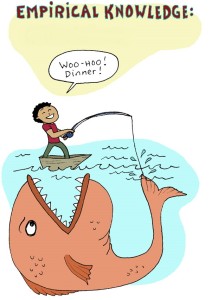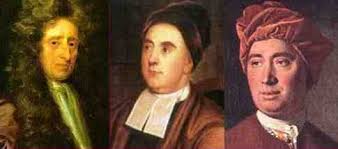 The Search for knowledge that is both absolute and certain has been fervent and continuous. However, since at least the time of Aristotle, there has been a strong epistemological tradition based solely on human experience, not directed toward the possibility of achieving absolute knowledge. This tradition is exemplified in the doctrine of empiricism. Empiricists argue that it is unreasonable to set a goal of absolute and all-inclusive knowledge — especially when there is close at hand the power to increase practical knowledge by slower but dependable methods. Empiricists are content to build a system of knowledge that has a high probability of being true even though its absolute certainty cannot be guaranteed. Empiricists find that high probability is a stable and realistic foundation for the knowledge accessible to human beings.
The Search for knowledge that is both absolute and certain has been fervent and continuous. However, since at least the time of Aristotle, there has been a strong epistemological tradition based solely on human experience, not directed toward the possibility of achieving absolute knowledge. This tradition is exemplified in the doctrine of empiricism. Empiricists argue that it is unreasonable to set a goal of absolute and all-inclusive knowledge — especially when there is close at hand the power to increase practical knowledge by slower but dependable methods. Empiricists are content to build a system of knowledge that has a high probability of being true even though its absolute certainty cannot be guaranteed. Empiricists find that high probability is a stable and realistic foundation for the knowledge accessible to human beings.Empiricists insist that human knowledge is acquired from experience — that it is a posteriori, or post-experiential. If we were trying to convince an empiricist that something exists, the empiricist would say, “Show me!” On points of fact she would have to be assured by her own experience. If we told her that there is a tiger in her bathtub, she would first demand that we tell her how we arrived at such a conclusion. If we explained that we saw the tiger in the bathtub, the empiricist would listen to this report of our experiences, but she would accept it only on the grounds that she or someone else could check the accuracy of our claim by taking a first-hand look for herself.
Two aspects of empirical theory are brought out in the illustration. The first is the distinction between the knower and the thing known. The knower is the subject, and the thing known is the object. There is a real world of external facts and objects that the person can perceive. Second, the truth or verification of facts or objects depends on their being experienced by other human beings. To be meaningful to the empiricist, statements about the existence or non-existence of anything must meet the criterion of the public verifiability.
A more complicated problem arises when statements are made about objects or events no longer available for direct verification. When it is asserted that George Washington chopped down his father’s cherry tree, empiricists would have to be convinced of at least three things: first, that the words “George Washington”and “cherry tree” refer to the kinds of things that one does experience; second, that someone was there and actually observed the event; and third, that empiricists had been there themselves, they also could have observed the event.
Another aspect of empiricism is its dependence on the principle of regularity. knowledge of the natural world is based on a perception of the regular way in which things behave. Nature is orderly. By describing the way things have happened in the past or by describing the uniform ways in which similar things behave in the present, the empiricist feels justified in making predictions about the probable behaviour of things in the future.
Besides appealing to regularity, the empiricist invoke the principle of resemblance. Resemblance means that those phenomena that are experienced as identical or similar really are enough alike to warrant making generalization about them. If we learn that one banana is tasty and nutritious, we want to be reasonably sure that the next object that looks and tastes like what we call a banana is not going to be fatally toxic. The more experience we have with banana-like things, the more reliable is our knowledge about what bananas are and what they mean in our experience. Resemblance involves the human ability to abstract likeness from distinctive objects or perceptions.
Typically, empiricists base their theory of knowledge on the experiences provided by our five senses. John Locke, who has been called the father of British empiricism, proposed a theory of knowledge in which the features we have discussed are combined in a clear fashion. Locke claimed that the human mind at birth is like a smooth was tablet (tabula rasa in Latin) on which sensory data etch themselves. As life progresses, more and more sensory impressions are transcribed. From the combination and comparison of sensations, complex ideas are produced. Locke viewed the mind as a receptacle that receives and stores sensations. knowledge results from the natural activity of the mind as it combines basic sensations. It is like a pantry with none opening (the senses) through which cans (sensations) enter to be kept and rearranged on the shelves.
These who insist that all knowledge can be reduced to sensory experience and who further insist that what cannot be traced to specific sense experiences is not true knowledge are called sensationalists, or radical empiricists. Modern radical empiricists might paraphrase Locke in the following manner: Knowledge is the result of a complex neurochemical process in which external objects stimulate one or more sense organs and cause a material or electrical change in the physical organ called the brain.

Source: INVITATION TO PHILOSOPHY: ISSUES AND OPTIONS